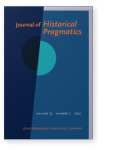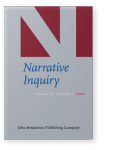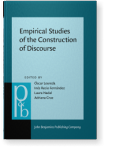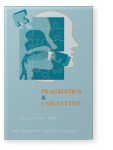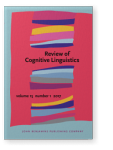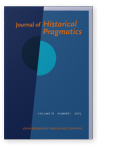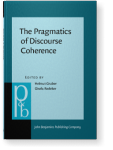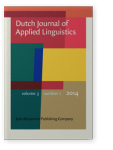Jacqueline Evers-Vermeul
List of John Benjamins publications for which Jacqueline Evers-Vermeul plays a role.
Articles
2022 Coherence in translation: A domains-of-use approach to subjectivity and causality in Bible translations Journal of Historical Pragmatics 23:2, pp. 204–244 | Article
When comparing old and new Bible translations, differences are striking at all discourse levels. This paper concentrates on variations in the representation of subjective cognition and reasoning of subjects in the discourse. A corpus-based analysis was conducted that compared the domains of use… read more
2020 Vivid elements in Dutch educational texts Narrative Inquiry 30:1, pp. 185–209 | Article
Educational publishers often make their expository texts more vivid, by making them emotionally interesting, concrete and imagery-provoking, and proximate in a sensory, temporal, or spatial way. Previous studies have found mixed results regarding the effects of vividness on the attractiveness,… read more
2019 Chapter 10. Subjectivity and Causality in discourse and cognition: Evidence from corpus analyses, acquisition and processing Empirical Studies of the Construction of Discourse, Loureda, Óscar, Inés Recio Fernández, Laura Nadal and Adriana Cruz (eds.), pp. 273–298 | Chapter
Cognitively oriented linguists have various linguistic resources at their disposal, and therefore need to develop methodological strategies of when to use which method. This chapter illustrates the benefits of using converging evidence. We review research results from several methodologies,… read more
2018 The linguistic marking of coherence relations: Interactions between connectives and segment-internal elements Pragmatics & Cognition 25:2, pp. 276–309 | Article
Connectives and cue phrases are the most prototypical linguistic elements that signal coherence relations, but by limiting our attention to connectives, we are likely missing out on important other cues readers and listeners use when establishing coherence relations. However, defining the role of… read more
2017 Expressing conditionality in Mandarin: A corpus-based study of rúguǒ and zhǐyào Chinese Language and Discourse 8:1, pp. 95–126 | Article
After a broad overview of Mandarin Chinese conditionality marking, this paper presents a corpus-based analysis of two conditional connectives, rúguǒ and zhǐyào (both translatable as ‘if’), from a syntactic and a cognitive perspective. We examine their use in narrative and informative texts along… read more
2017 On the online effects of subjectivity encoded in causal connectives Review of Cognitive Linguistics 15:1, pp. 34–57 | Article
Causal relations between sentences differ in terms of subjectivity: they can be objective (based on facts) or subjective (based on reasoning). Subjective relations lead to longer reading times than objective relations. Causal connectives differ in the degree to which they encode this subjectivity. read more
2015 Grammaticalization or pragmaticalization of discourse markers? More than a terminological issue Journal of Historical Pragmatics 16:1, pp. 59–85 | Article
Discourse markers are a crucial component of natural language, which is why a description and account of their diachronic evolution must be part of our linguistic models. However, researchers have different views on whether this evolution should be accounted for in terms of grammaticalization… read more
2014 “Why? Because I’m talking to you!” Parental input and cognitive complexity as determinants of children’s connective acquisition The Pragmatics of Discourse Coherence: Theories and applications, Gruber, Helmut and Gisela Redeker (eds.), pp. 209–242 | Article
We report a series of longitudinal studies on children’s acquisition of Dutch,
English and German causal connectives supporting a model in which children’s
cognitive development, parental input and the cognitive complexity of different
types of causality are brought into a systematic… read more
2014 Establishing coherence in schoolbook texts: How connectives and layout affect students’ text comprehension Dutch Journal of Applied Linguistics 3:1, pp. 1–29 | Article
This article focuses on the influence of connectives (because, so) and layout (continuous placement of sentences versus each sentence beginning on a new line) on the quality of students’ mental representations. By using multiple comprehension tasks, we found that cohesive text features have… read more
2013 Subjectivity and result marking in Mandarin Chinese Language and Discourse 4:1, pp. 74–119 | Article
Recent corpus studies have shown that differences in subjectivity − the degree to which speakers express themselves in an utterance − can account for the usage of causal connectives (because, so) in major European languages. If the notion of subjectivity is a basic cognitive principle, it ought to… read more
